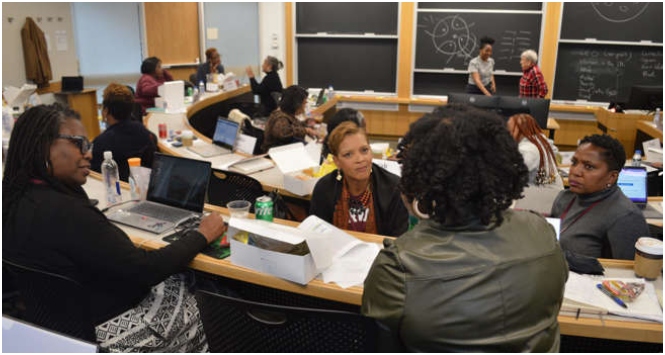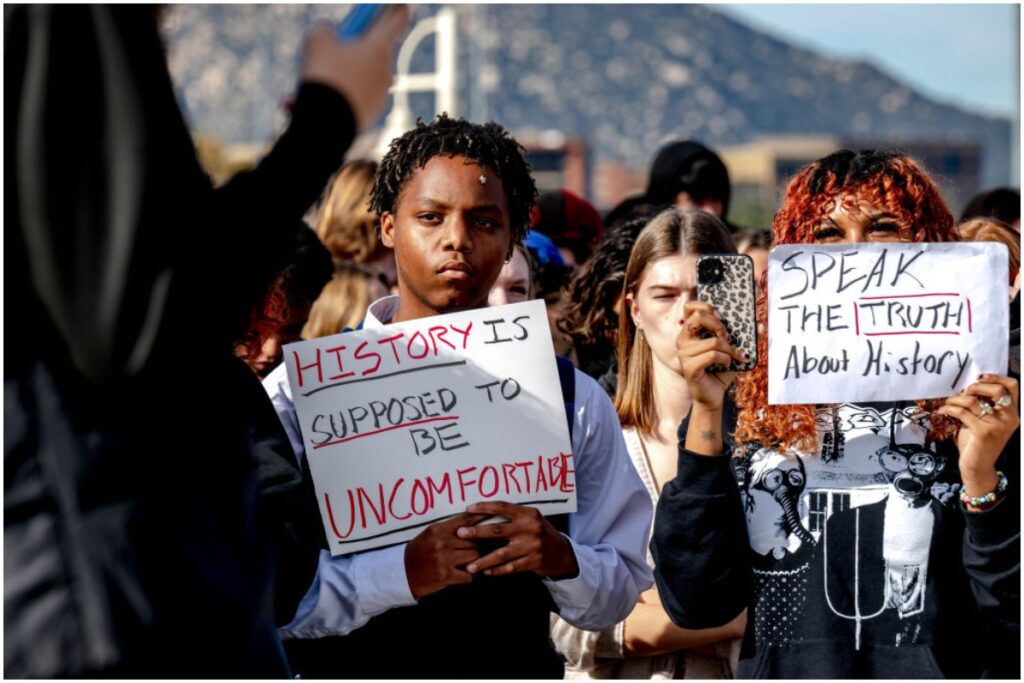In a political landscape increasingly defined by battles over civil rights, voting rights, and bodily autonomy, few documents have sparked as much alarm as Project 2025.
Published by The Heritage Foundation, Project 2025 is a sweeping, ultra-conservative manifesto that outlines a radical restructuring of the federal government, consolidating executive power while weakening the institutions that protect civil liberties.
For Black women in America, the implications of this plan are particularly dire, threatening hard-fought gains in civil rights, education, economic security, and reproductive health.
A Return to Systemic Disempowerment

Project 2025’s proposals target fundamental aspects of democracy, including civil rights enforcement, access to education, labor protections, and the integrity of the electoral system. While the document does not explicitly single out Black women, the policies it promotes would have devastating consequences for this demographic, exacerbating existing disparities and rolling back decades of progress.
Weakening Anti-Discrimination Protections
One of the most immediate threats posed by Project 2025 is the dismantling of key civil rights protections. The initiative seeks to eliminate racial demographic data collection by federal agencies, making it nearly impossible to track and combat racial discrimination in the workplace, education, and healthcare. For Black women, who already face wage gaps and systemic workplace discrimination, this policy shift could mean fewer legal avenues for redress.
Project 2025 also aims to weaken agencies that enforce anti-discrimination laws, including the Equal Employment Opportunity Commission (EEOC) and the Office for Civil Rights within the Department of Education. If enacted, these changes would leave Black women more vulnerable to employment discrimination, wrongful termination, and racial and gender biases in hiring and promotions.
The Attack on Education and Economic Mobility
Black women have historically relied on education as a ladder to economic mobility, but Project 2025 aims to cut off that path. The plan proposes dismantling the Department of Education, which plays a vital role in enforcing civil rights protections in schools and ensuring access to student loan relief programs.
If Project 2025 succeeds in eliminating federal student loan forgiveness programs and income-based repayment options, Black women—who carry more student loan debt than any other demographic—would bear a disproportionate burden. Additionally, the plan’s emphasis on privatizing education would deepen disparities in educational access and quality, limiting Black women’s opportunities for upward mobility.
Undermining Black Political Power
Black women have been at the forefront of voter mobilization efforts, playing a crucial role in shaping local and national elections. However, Project 2025 includes provisions to overhaul the U.S. Census Bureau, criminalize election-related offenses, and implement measures that could lead to voter suppression. These changes threaten to disenfranchise Black communities, making it harder to advocate for policies that address their needs.
By suppressing Black voter turnout and undercounting Black populations in the Census, Project 2025 would diminish Black women’s political influence, reducing their ability to elect representatives who will fight for their rights and interests.
Criminalization and the Expansion of Punitive Policies
The plan also signals a return to harsh criminal legal policies that disproportionately affect Black women and their families. Project 2025 seeks to expand the use of the death penalty and end federal oversight of police departments accused of civil rights violations. Given that Black women are more likely to be victims of police violence and wrongful incarceration, these policies could lead to an increase in state-sanctioned violence and systemic injustices.
Reproductive Rights Under Siege
Perhaps one of the most alarming aspects of Project 2025 is its attack on reproductive rights. The initiative proposes a federal ban on abortion and criminal penalties for healthcare providers who perform the procedure. This would be catastrophic for Black women, who already face disproportionately high maternal mortality rates and limited access to quality reproductive healthcare.
A federal abortion ban would force many Black women to carry high-risk pregnancies to term, further endangering their health. The criminalization of reproductive healthcare could also deter medical professionals from providing essential care, worsening existing health disparities.
Environmental Racism and Health Disparities
Environmental racism has long been a pressing issue for Black communities, with Black women and children suffering disproportionately from exposure to pollutants and inadequate healthcare. Project 2025 proposes shutting down the Office of Environmental Justice, a move that would allow corporations and polluters to operate with impunity in Black neighborhoods.
Without federal oversight, Black communities would be at greater risk of water contamination, toxic waste exposure, and other environmental hazards, leading to an increase in respiratory diseases, cancers, and other chronic illnesses.
Fighting Back Against Project 2025

While Project 2025 represents a direct assault on Black women’s rights and opportunities, history has shown that organized resistance can defeat efforts to roll back progress. The Legal Defense Fund (LDF) and other civil rights organizations are already mobilizing to challenge Project 2025’s proposals through legal advocacy, voter education, and grassroots activism.
Black women have long been the backbone of movements for justice, and their leadership will be critical in pushing back against this extremist agenda. From mobilizing voters to supporting policies that protect civil rights, economic security, and reproductive freedoms, collective action will be necessary to counteract the threats posed by Project 2025.
Remain vigilant, engaged
Project 2025 is more than just a policy proposal—it is a blueprint for systemic disempowerment that threatens to erase decades of progress for Black women in America.
If implemented, its far-reaching consequences would undermine civil rights, economic mobility, political participation, and access to healthcare. However, the fight is not over.
By remaining vigilant and engaged, Black women and their allies can resist these regressive policies and continue the march toward justice and equality.
